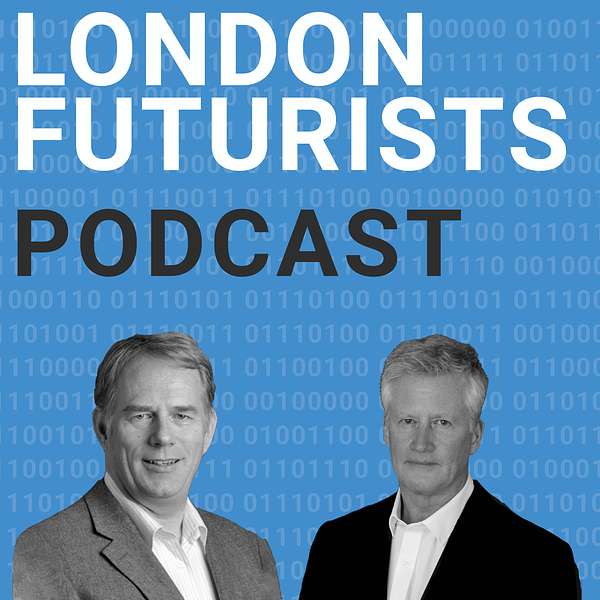
London Futurists
Anticipating and managing exponential impact - hosts David Wood and Calum Chace
Calum Chace is a sought-after keynote speaker and best-selling writer on artificial intelligence. He focuses on the medium- and long-term impact of AI on all of us, our societies and our economies. He advises companies and governments on AI policy.
His non-fiction books on AI are Surviving AI, about superintelligence, and The Economic Singularity, about the future of jobs. Both are now in their third editions.
He also wrote Pandora's Brain and Pandora’s Oracle, a pair of techno-thrillers about the first superintelligence. He is a regular contributor to magazines, newspapers, and radio.
In the last decade, Calum has given over 150 talks in 20 countries on six continents. Videos of his talks, and lots of other materials are available at https://calumchace.com/.
He is co-founder of a think tank focused on the future of jobs, called the Economic Singularity Foundation. The Foundation has published Stories from 2045, a collection of short stories written by its members.
Before becoming a full-time writer and speaker, Calum had a 30-year career in journalism and in business, as a marketer, a strategy consultant and a CEO. He studied philosophy, politics, and economics at Oxford University, which confirmed his suspicion that science fiction is actually philosophy in fancy dress.
David Wood is Chair of London Futurists, and is the author or lead editor of twelve books about the future, including The Singularity Principles, Vital Foresight, The Abolition of Aging, Smartphones and Beyond, and Sustainable Superabundance.
He is also principal of the independent futurist consultancy and publisher Delta Wisdom, executive director of the Longevity Escape Velocity (LEV) Foundation, Foresight Advisor at SingularityNET, and a board director at the IEET (Institute for Ethics and Emerging Technologies). He regularly gives keynote talks around the world on how to prepare for radical disruption. See https://deltawisdom.com/.
As a pioneer of the mobile computing and smartphone industry, he co-founded Symbian in 1998. By 2012, software written by his teams had been included as the operating system on 500 million smartphones.
From 2010 to 2013, he was Technology Planning Lead (CTO) of Accenture Mobility, where he also co-led Accenture’s Mobility Health business initiative.
Has an MA in Mathematics from Cambridge, where he also undertook doctoral research in the Philosophy of Science, and a DSc from the University of Westminster.
London Futurists
AI for organisations, with Daniel Hulme
Use Left/Right to seek, Home/End to jump to start or end. Hold shift to jump forward or backward.
This episode features Daniel Hulme, founder of Satalia and chief AI officer at WPP. What is AI good at today? And how can organisations increase the likelihood of deploying AI successfully?
02.55 What is AI good at today?
03.25 Deep learning isn’t yet being widely used in companies. Executives are wary of self-adapting systems
04.15 Six categories of AI deployment today
04.20 1. Automation. Using “if … then …” statements
04.50 2. Generative AI, like Dall-E
05.15 3. Humanisation, like DeepFake technology and natural language models
05.40 4. Machine learning to extract insights from data – finding correlations that humans could not
06.05 5. Complex decision making, aka operations research, or optimisation. “Companies don’t have ML problems, they have decision problems”
06.25 6. Augmenting humans physically or cognitively
06.50 Aren’t the tech giants using true AI systems in their operations?
07.15 A/B testing is a simple form of adaptation. Google A/B tested the colours of their logo
08 .00 Complex adaptive systems with many moving parts are much riskier. If they go wrong, huge damage can occur
08.30 CTOs demand consistency from operational systems, and can’t tolerate the mistakes that are essential to learning
09.25 Can’t the mistakes be made in simulated environments?
10.20 Elon Musk says simulating the world is not how to develop self-driving cars
10.45 Companies undergoing digital transformations are building ERPs, which are “glorified databases”
11.20 The idea is to develop digital twins, which enable them to ask “what if…” questions
11.30 The coming confluence of three digital twins: workflow, workforce, and administrative processes
12.18 Why don’t supermarkets offer digital twins to their customers? They’re coming
14.55 People often think that creating a data lake and adding a system like Tableau on top is deploying AI
15.15 Even if you give humans better insights they often don’t make better decisions
15.20 Data scientists are not equipped to address opportunities in all 6 of the categories listed earlier
15.40 Companies should start by identifying and then prioritising the frictions in their organisations
16.10 Some companies are taking on “tech debt” which they will have to unwind in five years
16.25 Why aren’t large process industry companies boasting about massive revenue improvements or cost savings?
17.00 To make those decisions you need the right data, and top optimisation skills. That’s unusual
17.55 Companies ask for “quick wins” but that is an oxymoron
18.10 We do see project ROIs of 200%, but most projects fail due to under-investment, or mis-understandings
19.00 Don’t start by just collecting data. The example of a low-cost airline which collected data about everything except rivals’ pricing
20.15 Humans usually do know where the signals are
22.25 Some of Daniel’s favourite AI projects
23.00 Tesco’s last-mile delivery system, which saves 20m delivery miles a year
24.00 Solving PwC’s consultant allocation problem radically improved many lives
25.10 In the next decade there will be a move away from pure ML towards ML+ optimisation
26.35 How these systems have been applied to Satalia
28.10 Daniel has thought a lot about how AI can enable companies to be very adaptable, and allocate decisions well
29.00 Satalia staff used to make recommendations for their own salaries, and their colleagues would make AI-weighted votes
29.30 The goal is to sc
Elevate how you lead with insight from today’s most influential executives.
Listen on: Apple Podcasts Spotify

